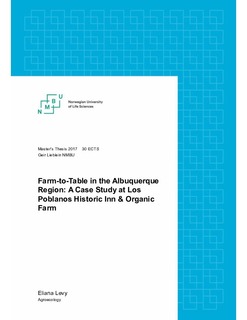| dc.description.abstract | This report explores a “Farm-to-Table” restaurant business model, using Los Poblanos Historic Inn & Organic Farm as a single-focus for this exploratory case study. Los Poblanos is chosen for this study due to their dedication to sustainable food and farming systems within the Albuquerque region of New Mexico, and the goal of this study was to examine how Los Poblanos operates in regards to Farm-to-Table and Local Food movements based on food purchasing practices. Food purchasing was analyzed through a systems perspective and agroecology framework by including social, economic and environmental considerations as to how food is grown, bought, processed, served and disposed. Data were collected through interviews with local growers who supply food to Los Poblanos, restaurant employees who manage the food, a local composting company and a non-profit organization, who all participated in interviews for the study. In addition to describing their role in the food and farming system linked to Los Poblanos, interviewees also commented on supporting and hindering forces to the Farm-to-Table movement in Albuquerque. Findings show that the management of food, namely minimizing waste to the upmost potential, was essential to creating an economically profitable food cycling system within the restaurant which allowed for paying premium prices of local, sustainably produced food. Chef’s knowledge of agriculture practices and systems stood out as a powerful tool to support and grow the Farm-to-Table movement both within the business and community food system. Inhibitors to the Farm-to-Table movement include consumers’ unwillingness to pay a higher price for local foods, which is associated with higher labor costs found especially in small scale, organic agriculture and cooking food from scratch the restaurant. Additionally, the overuse of the terms “Local” and “Farm-to-Table” falsely market restaurants who do not authenticate these claims with their purchasing decisions. Both issues may be addressed by storytelling, a method of communication to engage consumers and the local community in understanding how businesses such as Los Poblanos support local farmers and sustainable food growing. Primary suggestions from interviewees on supporting the Farm-to-Table movement beyond creating more demand focuses on collaboration between farmers in terms of resource and knowledge sharing, as well as government incentives to support businesses’ efforts to buy from producers in the community. Further analysis could examine how effective certain methods of communication and education are in spurring consumer interest in Farm-to-Table businesses, and how consumer knowledge catalyzes industry change by popular demand. | nb_NO |

